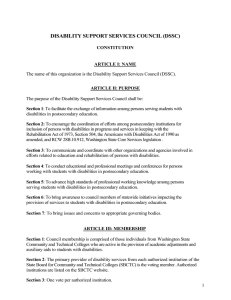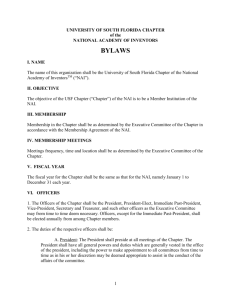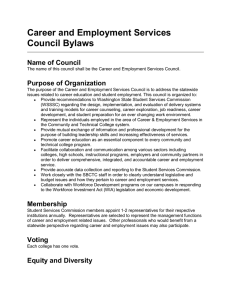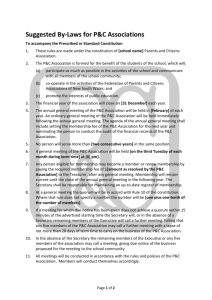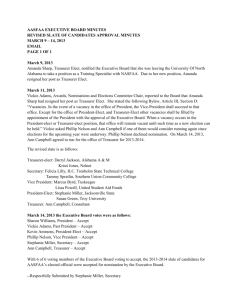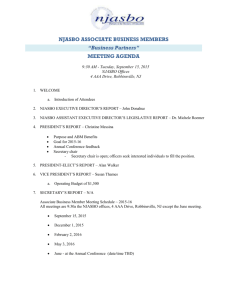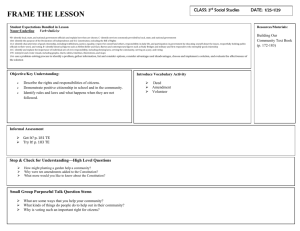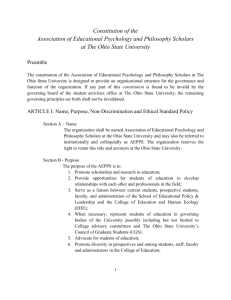DISABILITY SUPPORT SERVICES COUNCIL (DSSC)
advertisement
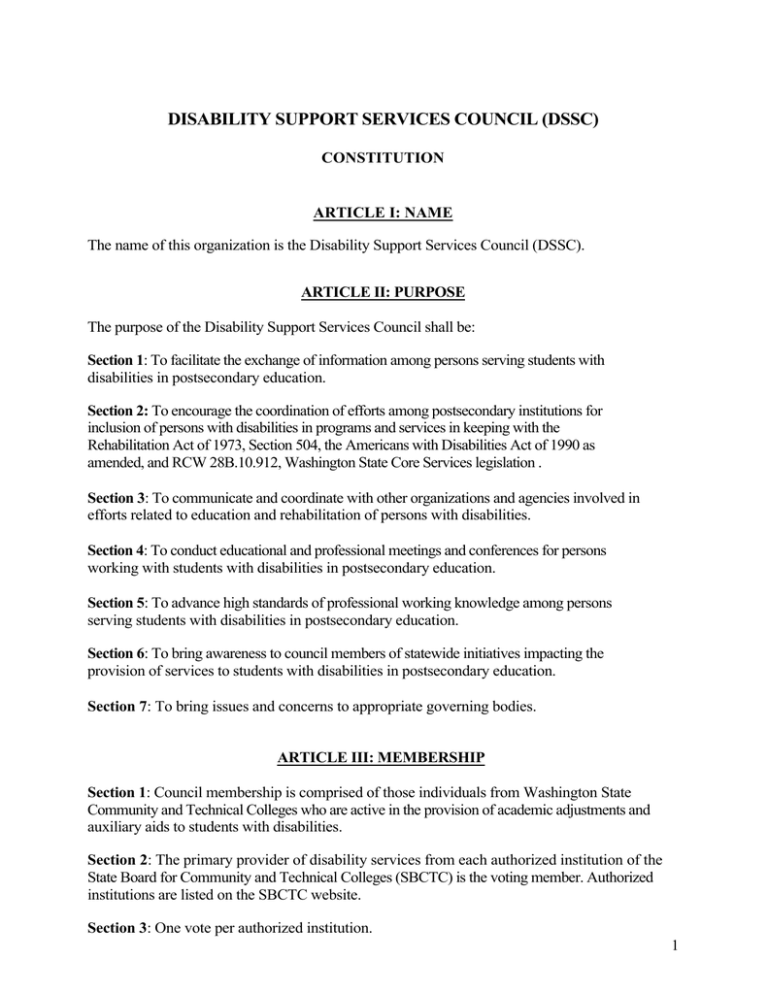
DISABILITY SUPPORT SERVICES COUNCIL (DSSC) CONSTITUTION ARTICLE I: NAME The name of this organization is the Disability Support Services Council (DSSC). ARTICLE II: PURPOSE The purpose of the Disability Support Services Council shall be: Section 1: To facilitate the exchange of information among persons serving students with disabilities in postsecondary education. Section 2: To encourage the coordination of efforts among postsecondary institutions for inclusion of persons with disabilities in programs and services in keeping with the Rehabilitation Act of 1973, Section 504, the Americans with Disabilities Act of 1990 as amended, and RCW 28B.10.912, Washington State Core Services legislation . Section 3: To communicate and coordinate with other organizations and agencies involved in efforts related to education and rehabilitation of persons with disabilities. Section 4: To conduct educational and professional meetings and conferences for persons working with students with disabilities in postsecondary education. Section 5: To advance high standards of professional working knowledge among persons serving students with disabilities in postsecondary education. Section 6: To bring awareness to council members of statewide initiatives impacting the provision of services to students with disabilities in postsecondary education. Section 7: To bring issues and concerns to appropriate governing bodies. ARTICLE III: MEMBERSHIP Section 1: Council membership is comprised of those individuals from Washington State Community and Technical Colleges who are active in the provision of academic adjustments and auxiliary aids to students with disabilities. Section 2: The primary provider of disability services from each authorized institution of the State Board for Community and Technical Colleges (SBCTC) is the voting member. Authorized institutions are listed on the SBCTC website. Section 3: One vote per authorized institution. 1 Section 4: The primary provider of disability services from each institution can delegate his/her vote/voting member status to another member of the disability services office at the same institution. The length of time the delegation is active is decided by the primary provider of disability services at that institution. Section 5: The primary provider of disability services or designee from each authorized institution is eligible to hold elected office. Section 6: All meetings of the Council shall be open to the public. Members of the audience shall be allowed to contribute to the discussion at the discretion of the president. ARTICLE IV: OFFICERS Section 1: The Board shall meet to afford preliminary hearings of committee reports; review the agenda for the next general meeting; review, approve or disapprove of expenditures and to consider such other items as necessary. The Board shall be composed of a President, PresidentElect, Secretary, Treasurer, Past President and Member-at-Large. Section 2: At the spring meeting, the President-Elect and Member-at-Large shall be elected for a one (1) year term by the Council and shall assume office July 1 following the election. The Secretary and Treasurer shall be elected for a two (2) year term by the Council and shall assume office July 1 following the election. The Secretary will serve starting in even numbered years and the Treasurer will serve starting in odd numbered years. Section 3: The President shall appoint a Nominating Committee consisting of President-Elect as chair person, plus two (2) additional Council members for the purpose of soliciting nominees for the election. Section 4: The Nominating Committee shall present a slate of nominees to the Council, preferably two (2) weeks prior to the spring meeting. The election will be held at the spring meeting. Section 5: The President shall call for nominations from the floor prior to voting. Section 6: Voting shall be by secret ballot. Section 7: The Nominating Committee shall be charged with the responsibility of tabulating the results. Section 8: The officers shall be elected by a majority of all voting members present. 2 ARTICLE V: DEFINITION OF DUTIES Section 1: The President, in addition to any duties imposed by action of the Council, shall preside at each regular and board meetings of the Council, sign all official documents regarding actions of the Council, establish meeting dates as needed, prepare the agenda for each meeting, appoint committees, and oversee listserve membership. While presiding at official meetings, the President shall have full right of discussion and voting. Section 2: The President-Elect shall chair the Nominating Committee, assist the president in preparing the Council agenda; preside as president pro tem in the absence of the president and succeed the current president upon completion of his/her term. The President-Elect shall perform duties as assigned by the President. Section 3: The Secretary shall ensure that minutes are recorded at each business and board meeting and maintain the list of voting members. The Secretary shall preside at meetings of the Council during the absence of both the President and President-Elect and shall perform duties as assigned by the President. Section 4: The Treasurer shall provide reports on the financial status of the Council at the regular meetings. The treasurer or designee identified by the President of the Council shall serve as the official Registrar for Council meetings by receiving registration fees and tracking revenue and expenses. The Treasurer shall preside at meetings of the Council during the absence of the President, President-Elect, and Secretary and shall perform duties as assigned by the President Section 5: The Past President shall assist the President with the transition of the Council information and processes and serve as a consultant. The Past President shall perform duties as assigned by the President. Section 6: The Member-at-Large shall perform duties as assigned by the President. ARTICLE VI: FILLING BOARD VACANCIES Section 1: President or President-Elect - in the event a vacancy occurs in the office of the President, the President-Elect shall assume the office and serve the balance of the term and the next term. In all cases where the President is temporarily unable to serve for a period of 90 days, the President-Elect will temporarily assume the office until the President can assume the responsibilities again. If the position of President-Elect becomes vacant, the President shall appoint a member in good standing to fill the vacancy. Such appointments are subject to approval by the Board. If the President-Elect is serving temporarily as President, the vacancy in the President-Elect position shall not be filled. Section 2: Secretary or Treasurer in the event a vacancy occurs in the office of the Secretary or Treasurer, the President shall recommend a member in good standing to fill the vacancy with approval from the Board. – 3 Section 3: President-Elect – in the event a vacancy occurs in the office of the President-Elect, the Board shall appoint a member in good standing to assume the responsibilities of Chair of the Nominations Committee. Section 4: Member-at-Large – in the event a vacancy occurs in the office of the Member-atLarge, the President shall recommend a member in good standing to fill the vacancy with approval from the Board. Section 5: In the case of a resignation, a vote of “no confidence” by a two-thirds vote of the Board, or death of any Board member, the President shall appoint a successor to serve the remainder of the term with the approval of the Board. Section 6: If at any time during an officer’s tenure he/she is no longer employed at a community or technical college in Washington, he/she is no longer eligible to serve on the Board. Section 7: All members appointed to fill vacant positions on the Board shall serve through the unexpired term of the position, except in the position of President. (ref Article VI, Section I). ARTICLE VII: BYLAWS Section 1: Bylaws appropriate to the execution of this Constitution shall be adopted by a majority vote of the voting members present. ARTICLE VIII: CONSTITUTION AMENDMENTS Section 1: Amendments to the constitution may be made by Council members presenting a written proposal to the board sixty (60) days prior to the next regular Council meeting. The Board must approve such amendments before presenting them to the Council for adoption. The approved proposed amendments shall be presented to the Council thirty (30) days prior to the next regular Council meeting. Section 2: A majority vote of the voting members present is needed to amend the Constitution. Section 3: Council approved amendments shall be forwarded to the Vice President of Student Services Commission liaison for approval through the Washington State Student Services Commission. Constitution and Bylaws approved by the Washington State Student Services Commission (WSSSC) 6/23/97 Amendments Constitution, Article IV - Officers, A, and B (1), October 15, 1999; Constitution, Article IV - Officers, B (2), C (1), (2), (5), (6), January 29, 2001; Bylaws, Section III - Meetings of the Council, (A), January 29, 2001; Bylaws, Section III - Meetings of the Council, G (5), approved by WSSSC, April 9, 2002; Constitution and Bylaws complete update and rewrite, approved by WSSSC, June 2008 Constitution, Article II – Purpose, (2); Article IV – Officers, (2); Article VI - Filling Board Vacancies, (3). October 23, 2013. Approved by WSSSC February 7, 2014. – 4
